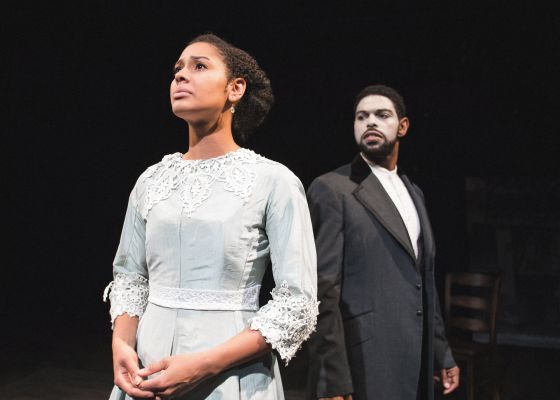
What you need to know about the play called The Octoroon is that it was authored by Dion Boucicault in 1848, and recounted the story of a proud Louisiana family menaced by a neighboring slaveholder bent on seizing their property, along with the young mixed-race woman of the play's title. (Officially, an octoroom is someone who is one-eighth black by descent.) It was lauded by audiences in both the Northern and Southern United States for its sympathetic portrayals of non-white characters — albeit stopping short of allowing its interracial lovers to marry, instead orchestrating the selfless suicide of its despairing heroine. Oh, and its resolution featured the latest in antebellum state-of-the-art technology: photography. The play dubbed “An” Octoroon — note the change from definite to indefinite article — is Branden Jacobs-Jenkins' examination of racial attitudes reflected in popular entertainment conceived by 19th-century playwrights. His deconstruction begins with his stand-in, "BJJ," explaining to us that all his white actors refused to play racist characters, forcing him to don Joey-clown whiteface, himself, in order to perform the dual roles of hero and villain. Native American actors likewise being in short supply, the part of just such a "noble savage" will be taken by the artificially scarlet visiting ghost of Dion Boucicault — stay with me, now — while the latter's assistant will be cast across racial and gender lines to portray grizzled Old Pete, wearing Javanese-puppet makeup. With a premise like this, it should come as no surprise when the maids deliver exposition couched in modern colloquialisms, the piano accompaniment comprises faux-Stephen Foster arrangements of modern pop ditties like "You Don't Own Me" and Br'er Rabbit serves as a Thornton Wilder-styled stage manager. A rule of thumb when constructing multidimensional meta-commentaries on existing texts is to write your commentary first, and then insert the source material in the remaining space. Melodrama is a hefty hunk of stage picture, even with Boucicault's "sensation scene" (spectacle involving a steamship fire) compressed into an ensemble-narrated synopsis. Director Chuck Smith is to be commended for reining in his cast's natural propensity for rushing material drawn from the original script for the sake of camp-giggles, but actors today being better trained for sprints than marathons, the energy level on opening night couldn't help but falter in the heavy-lifting second act. This temporary setback, however, proved no impediment to Jenkins' always-astute observations or the insights provided thereby.
